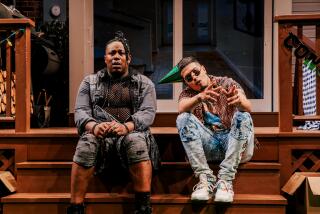One candid and ‘Constant’ comedy
Imagine a work pitched to respectable middle-aged audiences with an underlying message that monogamy is a lie and that anyone who claims to be still passionately in love after 10 years of marriage is either a great cheat or self-deluded fool.
If ever there was an unlikely play to take our subscription theaters by storm, it’s W. Somerset Maugham’s unflinchingly candid 1926 marital comedy “The Constant Wife.”
Yet the Old Globe’s mostly delightful revival, which opened Thursday, marks the third time I’ve seen the play in as many years. The two previous productions were Kyle Donnelly’s 2003 production at San Francisco’s American Conservatory Theater, followed by Mark Brokaw’s staging last summer by New York’s Roundabout Theatre Company (which starred Kate Burton and Lynn Redgrave).
Seret Scott, who directed this latest foray, locates the emotional center of the piece more successfully than the others. Still, you can practically hear the silence on the drive home from the theater after a few gingerly phrased words of post-show small talk:
“Did you enjoy the play, dear? Very witty, wouldn’t you say?”
“Not bad, not bad. This Maugham has a terrific sense of humor. Yet he must have been married to a devilishly difficult wife.”
“Says here in the program that Maugham was a bisexual. Also apparently a stammerer.”
“Knew there had to be something.”
“Glad we don’t have such problems.”
[Pause]
“Yes, dear, we must be one of the lucky ones.”
Maugham’s strategic genius lies in the way he places the questions that everyone secretly wants to ask about marriage in a suave theatrical package that makes the indigestible answers seem less discomforting than if a friend confided the same.
As your romantic myths are being shattered, you can’t help but want to move into the posh drawing room (sleekly designed in black and white by Ralph Funicello) in which the characters are so impressively bandying epigrams, or notice how well they manage, despite everything, to all get along.
For those who haven’t ever seen the play, I won’t give away too much, except to say that something’s revealed about Constance’s seemingly happy marriage to John, which (though no shock in this relentlessly gossipy world) changes forever the terms of their relationship.
The kicker is that when this open secret is publicly exposed (and it’s a doozy involving one of the couple’s closest friends), instead of devastating Constance, it turns into an opportunity for her to discover her own unsuspected strength and jubilant sense of freedom. Part Wilde, part Ibsen, “The Constant Wife” also has elements of a Jill Clayburgh vehicle gussied up in Edwardian garb.
The production boasts a number of good performances. First, kudos must go Henny Russell, who stars as Constance. A diffident-looking blond with intelligence gleaming in her eyes, Russell offers a portrait of a woman whose finesse in dealing with socially awkward circumstances doesn’t mean she’s doesn’t feel the humiliating sting. She may saunter around her smashingly well-appointed home without a hair out of place, but under the enviably elegant facade lurks a philosopher in deep contemplation of hard facts.
Her mother, Mrs. Culver, is played by Kandis Chappell, an actress who strikes me on first viewing as one of the great unsung treasures of the American theater. Utterly natural in her handling of Maugham’s quipping artificiality, she is an updated version of Wilde’s Lady Bracknell, only more considerate of family, not to say recognizably human.
One of the problems with Chappell’s adroitness, particularly in her splendid first scene with her other daughter, the morally inflamed Martha (Heidi Fecht), who thinks Constance needs to be informed of the worst, is that she makes the less seasoned performers around her seem pedestrian (if not at times downright phony) by comparison. No one can match her incontestable reality in a comedy whose stylization is very tricky to pull off these days.
The other issue, obviously also not her fault, is that she is absurdly costumed. Lewis Brown’s wardrobe designs -- hats that make the women looks like grasshoppers, dresses whose fabrics and colors no upper-class woman would be caught dead in, and unflattering monkey suits for the men -- create an obstacle that all of the performers must strive valiantly to overcome. And most do not have Chappell’s incandescent talent to help them.
Of the men, I especially liked J. Paul Boehmer’s heartfelt turn as Bernard, the aging former suitor of Constance who still can’t help holding out hope that one day they might be together. When the two reunite after a 15-year absence, you can see the blush spread across his face and feel his embarrassment at his helpless longing.
As Constance’s problematic husband, John, Wynn Harmon allows us a glimpse of what his wife sees in him despite his chauvinist hypocrisy. It’s a performance that, like the production as whole, more than competently maps out the essential points.
One of which is the potential for continued growth that lies within all of us. Maugham may not subscribe to the happily-ever-after school of playwriting, but what makes the challenging sentiment of his play so palatable is his confidence in our ability to handle uncomfortable truth with enviable panache.
*
‘The Constant Wife’
Where: Old Globe Theatre, Balboa Park, 1363 Old Globe Way, San Diego
When: 7 p.m. Tuesdays and Wednesdays, 8 p.m. Thursdays and Fridays, 2 and 8 p.m. Saturdays, 2 and 7 p.m. Sundays
Ends: May 7
Price: $19 to $59
Contact: (619) 234-5623
Running time: 2 hours, 10 minutes
More to Read
The biggest entertainment stories
Get our big stories about Hollywood, film, television, music, arts, culture and more right in your inbox as soon as they publish.
You may occasionally receive promotional content from the Los Angeles Times.











